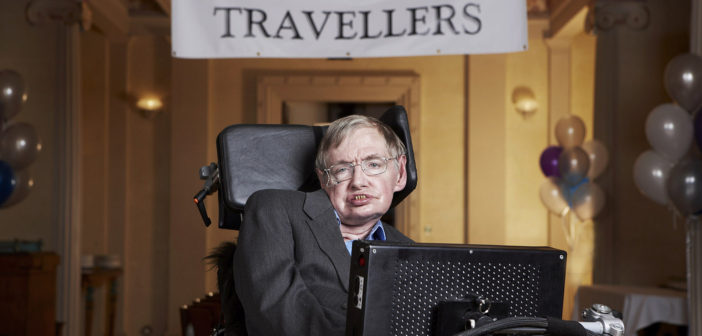One of my five reasons for hope is “the indomitable human spirit”. No one exemplifies this more than Stephen Hawking. He was diagnosed with the slow-progressing form of motor neurone disease, also known as Lou Gehrig’s disease, when he was 21 years old, and told he had only two years to live. At first he was very depressed and wanted to give up his studies. “What was the point?”, he said. But his doctors persuaded him to carry on, and, as everyone knows, he became an academic genius, a brilliant theoretical physicist and cosmologist. He was, quite rightly, treated as a celebrity. He carried on teaching and lecturing around the world even as his disease gradually paralyzed more and more of his body.
Hawking lived a fuller life than many people who are physically healthy despite the disease that gradually invaded more and more of his body. When he was no longer able to speak he used voice simulators, which he initially operated with one hand and eventually, when he could not even use one finger, learned to operate it with a muscle of his cheek. And it was in this way that he communicated with audiences around the world, flying to different venues in a specially designed private jet.
He had the advantage he had of a loving family and a superb medical team that, right up to his death, kept his body working sufficiently to enable his brain to continue to function. When asked how he maintained his mental energy, what kept him going, he said that he concentrated on what he could and would do and not on those things which he was unable to do. And he had a sense of humor as well.
In the end he was all mind – and what a mind, contemplating the origin of the universe, enjoying heated discussions with other scientists, and helping the general public to understand (well, more or less!) things like the Big Bang and black holes. A mind that gave him the will to live. I met him once, in 1989 and I am really glad I had that opportunity of spending a few moments with one of the most remarkable people on our planet. He studied the stars – and he himself was a super-star.
And as I said at the beginning, he was a shining example of that indomitable spirit that enables people to tackle the seeming impossible and never give up. Stephen, we shall miss your physical presence among us and your simulated voice that became so familiar. But your wisdom will remain with us for ever, captured in your books and films and in our memories.

The Jane Goodall Institute is a global community conservation organization that advances the vision and work of Dr. Jane Goodall. By protecting chimpanzees and inspiring people to conserve the natural world we all share, we improve the lives of people, animals and the environment. Everything is connected—everyone can make a difference.







